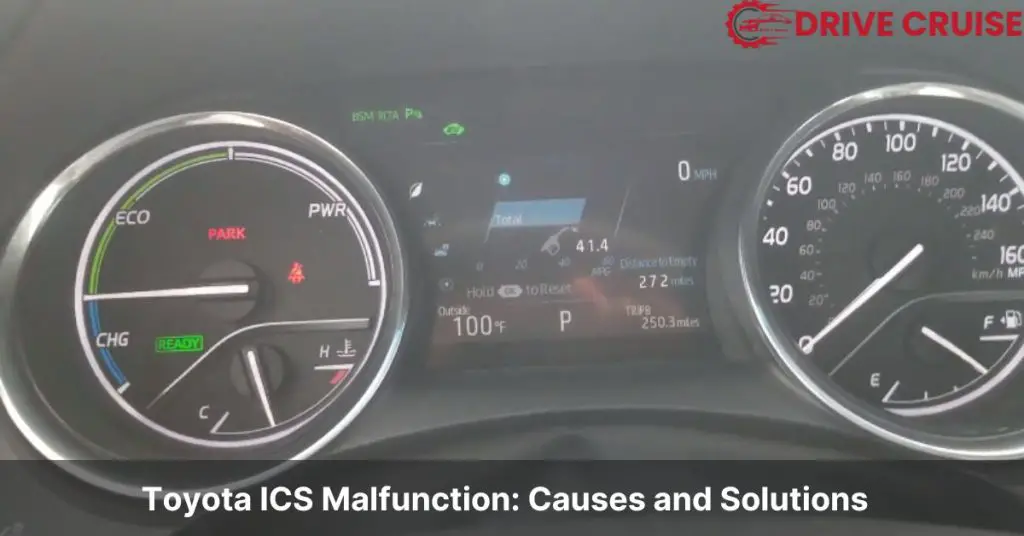We’ve all come to rely on the advanced safety features in our vehicles, expecting them to work seamlessly to protect us on the road. Among these, Toyota’s Intelligent Clearance Sonar (ICS) system stands out for its ability to prevent collisions during low-speed maneuvers. But what happens when this sophisticated system malfunctions?
Navigating the ins and outs of a Toyota ICS malfunction can be daunting. We’re here to shed some light on this issue, offering a glimpse into what causes these malfunctions and how they can affect your driving experience. Whether you’re a Toyota owner or just someone intrigued by automotive technology, understanding these challenges is essential for staying informed about the vehicles we trust every day.
Understanding Toyota ICS Malfunction
Following the discussion on the importance of Toyota’s Intelligent Clearance Sonar (ICS) system, we delve deeper into understanding the ICS malfunction itself. This technology serves as a critical safety feature, designed to prevent collisions during low-speed maneuvers by automatically stopping the vehicle if an obstacle is detected. However, like any advanced technological feature, the ICS is not immune to malfunctions.
A Toyota ICS malfunction often presents through warning lights appearing on the dashboard, specifically indicating issues within the sonar system. The reasons behind such malfunctions can vary, encompassing a range of causes from simple to complex.
- External Factors: Dirt, ice, or snow covering the sensors can hinder their ability to detect obstacles accurately, leading to malfunctions. Regular cleaning of the sensors can help mitigate this issue.
- Sensor Damage: Physical damage to the sensors, possibly from minor impacts or driving in harsh conditions, can lead to faulty readings or total failure of the ICS system.
- System Errors: Software glitches or problems with the vehicle’s onboard computer may cause intermittent or chronic malfunctions in the ICS system. These require professional diagnostic tools for identification and resolution.
- Electrical Issues: Wiring problems or corroded connections can impair the sensors’ ability to communicate with the vehicle’s computer, necessitating thorough electrical inspections.
Addressing a Toyota ICS malfunction typically involves identifying the root cause through diagnostics. Once identified, solutions range from simple cleaning or resetting of the system to more complex repairs like sensor replacement or software updates. In many cases, professional service from a Toyota dealership or a qualified technician is recommended, ensuring the proper functioning of this vital safety feature.
Understanding the common causes and potential fixes for ICS malfunctions not only enhances safety but also empowers Toyota owners to take proactive steps in maintaining their vehicles’ integrity.
Diagnosing Toyota ICS Issues
When confronted with Toyota ICS malfunctions, it’s crucial to approach diagnostics methodically to ensure accurate identification of the problem. Here, we outline key steps and considerations in pinpointing and resolving ICS issues.
Initial Visual Inspection
A thorough visual inspection of the ICS sensors serves as our first step. Debris, mud, or even minor physical damage can impair sensor functionality, leading to false warnings or system failure. We ensure to check the sensors located around the vehicle’s bumper for any obstruction or damage.
Error Codes and Dashboard Warnings
Next, we look at the vehicle’s dashboard. Toyota vehicles equipped with ICS will display specific warning lights or messages when the system encounters problems. Using a diagnostic scan tool, we can read these error codes. The codes provide us with detailed insights into the nature of the malfunction, whether it involves a specific sensor or a communication issue within the system.
Electrical System Check
Electrical connections and wiring are crucial for ICS operation. We check for loose connections, frayed wires, or corrosion that might interrupt the system’s electrical supply. Such issues can prevent the ICS from functioning correctly and may require careful repair or replacement of the affected components.
Sensor Functionality Test
Testing each sensor’s functionality helps us pinpoint malfunctions accurately. This step often involves using diagnostic equipment to simulate parking scenarios and observe how each sensor responds. Non-responsive or erratically behaving sensors might need cleaning, recalibration, or replacement.
Consultation with a Professional
If our initial diagnostics don’t resolve the issue, or if we identify complex electrical or software problems, we recommend consulting with a certified Toyota technician. Professionals have access to advanced diagnostic tools and software updates that can effectively address and rectify ICS malfunctions, ensuring the system operates as intended and maintains vehicle safety.
By following these steps, we can accurately diagnose and address Toyota ICS issues, restoring this vital safety feature’s functionality and giving drivers peace of mind during their travels.
Solutions and Fixes for Toyota ICS Malfunction
After taking the initial steps to diagnose Toyota ICS issues, we move on to discussing potential solutions and fixes that can help restore the system’s functionality. Our focus is on straightforward measures that vehicle owners can undertake, as well as when it’s crucial to seek professional assistance.
Resetting the ICS System: A simple reset can sometimes resolve minor glitches. This involves turning off the vehicle, waiting for a few minutes, and then restarting it. Resets can clear error codes that may have temporarily disrupted the system.
Cleaning the Sensors: Dirt, mud, or snow covering the sensors can obstruct their functionality. We recommend gently cleaning the sensors with a soft cloth and mild cleanser, ensuring they’re free from obstructions that could impede their accuracy.
Checking for Loose Connections: Inspecting the connections and wiring linked to the ICS sensors is essential. If any loose connections are found, securely reattaching them can often fix the issue, restoring normal sensor operation.
Updating the System Software: Just like smartphones and computers, the ICS system may require updates. If the malfunction persists, checking for a software update with a Toyota dealer might resolve underlying compatibility issues.
Professional Diagnostic: When the above steps don’t rectify the problem, it’s time to consult with a Toyota professional. Specialists have advanced diagnostic tools and in-depth knowledge that can identify and correct complex issues beyond the reach of typical DIY fixes.
Replacing Faulty Sensors: Sometimes, a malfunction indicates a failure of one or more sensors. In such cases, replacing the faulty sensors is the only solution to ensure the ICS system works as intended.
By following these solutions, we can address Toyota ICS malfunctions effectively. It’s crucial to remember that if you’re ever in doubt about your ability to solve the problem, it’s always best to consult with a professional to maintain the system’s integrity and your vehicle’s safety.
Preventing Future ICS Malfunctions in Toyota
Building on our foundation of solving Toyota ICS issues, we’re turning our attention to preventing future malfunctions. Prevention plays a pivotal role in ensuring the Intelligent Clearance Sonar (ICS) system remains effective and reliable. By adopting a proactive approach, drivers can significantly reduce the likelihood of encountering similar problems down the line. Here are some strategies we’ve identified:
Regular Maintenance Checks
Conducting regular maintenance checks is crucial. These include visually inspecting the sensors for any obstructions or damage and ensuring they’re clean. Dirt, snow, and even wax can interfere with the sensors’ ability to accurately detect obstacles.
Software Updates
Staying current with software updates is another key preventive measure. Toyota occasionally releases updates to the vehicle’s system, including the ICS. These updates can improve functionality and correct any bugs that may cause malfunctions.
Professional Sensor Calibration
Having the sensors professionally calibrated at recommended intervals or after any vehicle repair involving the front or rear bumper can prevent misalignments that might lead to ICS errors. This process ensures that the sensors’ angles and sensitivities are correctly set according to Toyota’s specifications.
Avoid Harsh Driving Conditions
Whenever possible, avoid exposing your vehicle to harsh driving conditions that could affect the ICS sensors. This includes driving through deep puddles, mud, or heavy snow, which can deposit debris on the sensors and impair their function.
Investing in Quality Replacements
If a sensor requires replacement, opting for quality parts ensures that the new sensor performs as well as the original. Investing in quality replacements can prevent future failures and maintain the integrity of the ICS system.
By following these practices, we can help safeguard the ICS system’s functionality, reinforcing the safety features in our Toyota vehicles.
Real-World Impacts of ICS Malfunctions
Building on the importance of keeping the Intelligent Clearance Sonar (ICS) system in optimal condition, you’ll find that ICS malfunctions can have several real-world implications, directly affecting drivers and pedestrians alike. Understanding these impacts reinforces the need for the preventive measures we discussed, such as regular maintenance and investing in quality replacements.
First, reduced safety features are immediate consequences of ICS malfunctions. The ICS system plays a critical role in preventing collisions by alerting drivers to obstacles in their path, especially during parking or low-speed maneuvers. A malfunctioning ICS system might fail to alert drivers in time, increasing the risk of collisions with objects, other vehicles, or even pedestrians.
Second, ICS malfunctions can lead to increased costs for Toyota owners. Collisions, even minor ones, often lead to costly repairs or higher insurance premiums. Moreover, if ICS issues are not addressed promptly, the risk of more significant damage or even complete system failure rises, leading to potentially expensive replacements.
Third, loss of vehicle value is another concern. Vehicles known for safety issues, including those related to ICS malfunctions, may see a decrease in resale value. Prospective buyers are likely to be hesitant about purchasing a car with a reputation for safety system malfunctions.
Fourth, there’s a psychological aspect. Drivers rely on advanced assistance systems like the ICS for peace of mind. Knowing that this system might not function correctly can lead to increased anxiety and decreased confidence while driving, particularly in challenging parking scenarios or tight spaces.
Navigating through these real-world impacts highlights the importance of the preventive strategies we’ve outlined. Regular maintenance checks, staying updated with software, professionally calibrating sensors, avoiding harsh driving conditions, and investing in quality replacements not only ensure the reliability of the ICS system but also safeguard against the practical and economic repercussions of system malfunctions, thereby maintaining vehicle value and driver confidence.
Conclusion
We’ve covered a lot about Toyota’s ICS system and its crucial role in keeping us safe on the road. Dealing with malfunctions promptly not only saves us from potential hazards but also guards against hefty repair bills and the stress of driving a compromised vehicle. Let’s not forget the peace of mind that comes with knowing our car is functioning as it should. By staying on top of maintenance and updates we’re not just protecting our investment but also ensuring a safer driving experience for everyone. So here’s to keeping our Toyota’s ICS in top shape and our journeys smooth and secure.
Related Posts:
- C1241 Code Toyota: What It Means and How to Fix It
- Drive Light Blinking on Honda Pilot: Causes and Solutions
- Firestone vs Michelin Tires: Which One is the Best for Your Car?
- How Much Do Tractor Tires Weigh? A Friendly Guide to Understanding Tractor Tire Weight
- Toyota ICS Malfunction: Causes and Solutions
- Westlake Tires Review: Affordable and Reliable Tires for Your Vehicle











